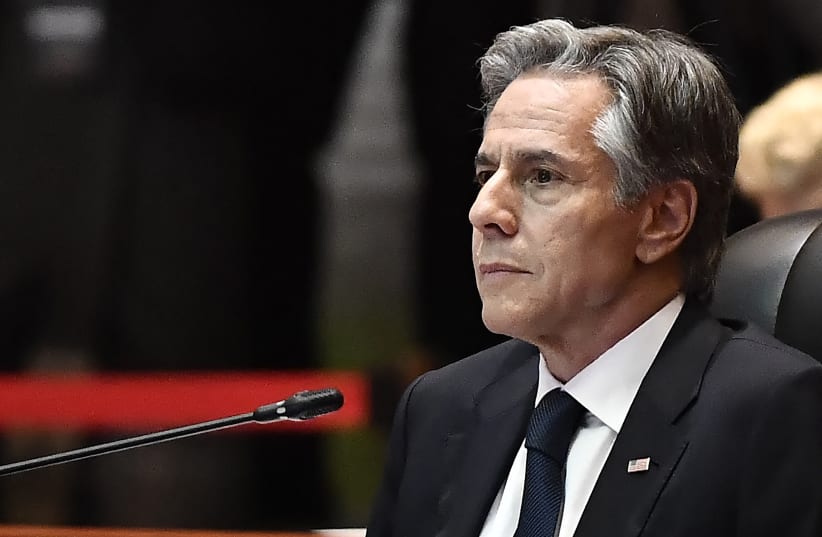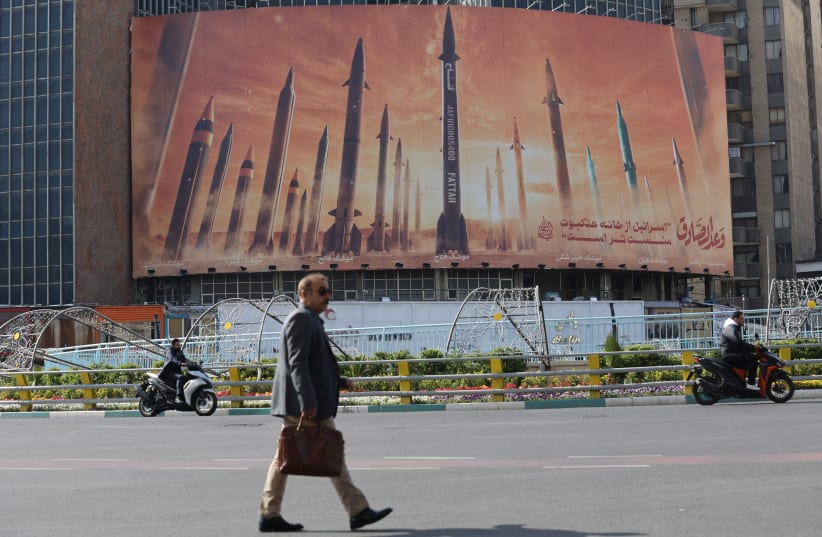Foreign
Blinken to G7: Iran, Hezbollah may begin attack on Israel on Monday – report

Unlike the Iranian strike against Israel on April 13, the possible scenarios are less clear.
An attack by Iran and Hezbollah against Israel could begin as early as Monday, US Secretary of State Antony Blinken told his counterparts from the G7 countries in a Sunday conference call, Walla reported on Monday, citing three officials familiar with the matter.

The purpose of the call was allegedly to coordinate US’s closest allies and make last-minute attempts to put diplomatic pressure on Iran and Hezbollah to minimize their retaliatory actions.
Separately on Sunday, three US and Israeli officials also told Axios reporter Barak Ravid that the attack could occur on Monday. An Israeli official also told CBS News that while Iran’s April 13 attack was mostly thwarted, Israel was anticipating a “more aggressive” retaliation this time around.
The sources told Walla that, in his meeting, Blinken emphasized that the US believes that Iran and Hezbollah will retaliate, but unlike the Iranian strike against Israel on April 13, the possible scenarios are less clear.
Blinken said that the US does not know the exact timing of the attacks but stressed that they could begin as early as the next 24-48 hours – that is, starting on Monday, the sources told Walla.
In the April 13 attack, Israel was assisted by the United States, Great Britain, France, Qatar, Egypt, Jordan, Saudi Arabia, the United Arab Emirates and Bahrain in intercepting the Iranian drones and missiles. The coalition successfully intercepted 99% of the missiles.
On Monday morning, Western diplomats told KAN that it would be possible to restore the regional coalition that confronted the April attack. The diplomats told the Israeli state broadcaster there was no reason the parties would not cooperate again and that “everyone has an interest that the event does not turn into a regional war.”
US attempts to deescalate
The sources said to Walla that Blinken asked the other foreign ministers to exert diplomatic pressure on Iran, Hezbollah, and Israel to exercise maximum restraint.
Blinken also told G7 foreign ministers that the buildup of US forces in the region was for defensive purposes only, the sources said.
It was announced on Sunday that the US military will deploy additional fighter jets and Navy warships to the Middle East, the Pentagon said on Friday, as Washington seeks to bolster defenses following threats from Iran and its allies Hamas and Hezbollah.
According to the sources, Blinken said that the goal is to limit the impact of the attacks by Iran and Hezbollah on Israel and emphasized that this is the best way to prevent an all-out war.
One source who was in the conversation said that Blinken sounded frustrated when he briefed the other ministers on the talks with Israel regarding the hostage deal and a Gaza ceasefire.
“We felt we were close to a breakthrough in the Gaza deal, but then the assassination happened in Tehran. Now we need the deal more than ever,” Blinken said.
American Defense Minister Lloyd Austin spoke on Monday with Defense Minister Yoav Gallant. He reiterated the firm support of the United States for Israel’s security and its right to self-defense against the threats from Iran, Lebanon, Hezbollah, the Houthis, and other terrorist organizations supported by Iran. They discussed the reinforcement of American forces, which they said are needed to protect US personnel, support the defense of Israel, and deter and reduce tensions in the region.
Austin also expressed his firm support for a ceasefire in Gaza and a deal to release the hostages.
The commander of the US Army’s Central Command, General Michael Korilla, arrived in Israel on Monday to finalize coordination with the IDF in preparation for the possible attack by Iran and Hezbollah, senior Israeli officials said.
Preparations on the Home Front
The G7 ministers reportedly expressed concern at the “heightened tension” in the region and called on “all involved parties once again to refrain from perpetuating the current destructive cycle of retaliatory violence, to lower tensions and engage constructively toward de-escalation.”
Prime Minister Benjamin Netanyahu held a meeting on Sunday night with Defense Minister Gallant and the heads of the military and the intelligence community to discuss the impending attack by Iran and Hezbollah and the possible Israeli response, senior Israeli officials said.
“Iran and its agents are looking to surround us with a stranglehold of terror. We are determined to stand up to them on every front and in every arena – near and far. Whoever seeks to harm us will pay a very heavy price,” Netanyahu said on Sunday.
An Israeli official told NBC news on Monday that Israel is preparing to endure a multi-day attack from Iran and Hezbollah.
“They’ll just try to wear us out,” the official told NBC, adding that, as opposed to Iran’s attack in April, the coming attacks could span several days as Hezbollah fires at Israel from the north and Iran launches longer-range weapons from the east.
The regional picture
Other countries in the region are also preparing for a dramatic escalation and are making efforts to try and prevent it. Multiple countries, such as Japan and Turkey on Monday morning, have asked citizens to leave Lebanon due to fear of escalation.
Jordanian Foreign Minister Ayman Safadi made a rare visit to Tehran on Sunday – the first such visit by a Jordanian foreign minister in almost a decade. Jordan is allegedly concerned about an Iranian missile and drone attack that would be expected to pass through its airspace. During the attack on April 13, Jordan intercepted Iranian drones that were making their way towards Israel and allowed American and Israeli fighter jets to use its airspace to intercept Iranian drones and cruise missiles. Safadi met with the acting Iranian Foreign Minister Ali Bagheri and conveyed him a message from King Abdullah II to the President of Iran, according to a statement from the Jordanian Ministry of Foreign Affairs. “I came to express concern about the escalation in the region. I did not come here to convey a message from Israel or to receive a message from Israel,” Safdi said after his meeting in Tehran.
Several Iranian officials vowed that the country would avenge Hamas leader Ismail Haniyeh’s assassination, as Israel remains on high alert for a potential attack and the United States is sending additional forces to the region.
Iran’s Islamic Revolutionary Guards Corps said on Saturday that revenge would be “severe and at an appropriate time, place, and manner,” blaming the “terrorist Zionist regime” for Haniyeh’s death.
However, Iran’s foreign ministry spokesperson Kanaani said on Monday that Iran is not looking to escalate regional tensions but believes it needs to punish Israel to prevent further instability.

























